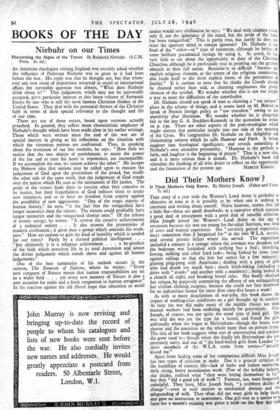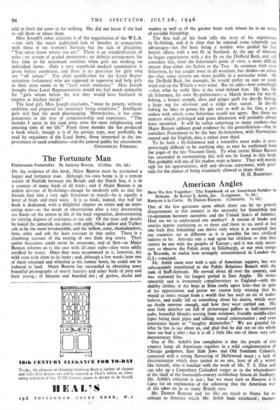Did Their Mothers Know ?
Tins story of a year with the Women's Land Army is probably as objective in tone as it is possible to be when one is seeking to entertain and writing about oneself. Naive humour, stories that fall a little flat—these are small drawbacks to a narrative which contains a good deal of amusement with a good deal of sensible criticism. Miss Joseph joined the Women's Land Army •- at. the age of seventeen because she was too young for the other Services, was fond of cows and wanted experience. She " certainly gained experience, more sometimes than I bargained for " at the two W.L.A. hostels, and several private billets where she served. The experience included a sojourn in a cottage where the cowman was drunken and the bedroom was furnished with nothing but a bed ; threshing, hoeing, milking and other hard tasks ; being kicked by cows (once against railings so that she lost her senses for a few minutes); playing ping-pong with Americans ; dealing with a party of girls who had drunk too much beer ; much hitch-hiking (including a drive with " crooks " and another with a murderer); being locked in a church all night, and breaking hostel rules. She finally obtained her release, by purposely committing the offence of not relinquishing her civilian clothing coupons, because she could not face landwork for an industrious farmer for more than sixty-five hours a week! As with so many descriptions of war-jobs, this book shows the impact of working-class conditions on a girl brought up in comfort. At least the war did make many of the middle classes see what manual workers had been enduring mutely for generations. Miss Joseph, of course, was not quite the usual type of land girl. She was told she was not the type for a hostel, and found the girls unfriendly when she began at Shrivenham—though the hours were shorter and the amenities on the whole more than on private farms. The title of her book suggests what sort of conversation and conduct she grew used to ; though when she finally left Shrivenharn she was extremely sorry, and one of " the hard-boiled girls from London "- most members of the W.L.A. come from towns—" actually kissed me."
Apart from finding some of her companions diffidult Miss Joseph has two types of criticism to make. One is a general criticism of the hardships of country life—lack of baths and indoor sanitation, early rising, heavy monotonous work (Few of the holiday helpers, she thinks, realised what "they were letting themselves in for" but they "did a good job of work.") Farmers, too, were frequently unhelpful. They have, Miss Joseph finds, " a stubborn dislike of change "—even in such matters as mechanical devices and the safeguarding of milk. They often did not want girls to help then', and gave no instruction to newcomers. One girl sent as a novice to a farm for a month's. -training was' given 'a stick ,on the first, day and •
told to fetch the cows in for milking. She did not know if she had to call them or chase them.
Miss Joseph's other criticism is of the organisation of the W.L.A. —not only the much publicised lack of benefits in 'comparison with those of the women's Services but the lack of discipline. " You never know where you are." There is no standardisation of rules ; no system of graded promotion ; no definite arrangement for free time or for maximum overtime when girls are working on individual farms. Only a very superficial medical examination is given before enrolment, and there is no provision for girls whq are " off colour." The chief qualification for the Local Repre- sentatives (voluntary) who are supposed to supervise and help girls in their areas seems to be " local social eminence." Miss Joseph thought these Local Representatives would not feel much sympathy for " girls whom before the war they would have hesitated to employ as kitchen maids."
The land girl, Miss Joseph concludes, " must be patient, without ambition and prepared for insanitary living conditions." Intelligent girls will find the work discouraging. Nevertheless, it has com- pensations in the way of companionship and experience. " The months I spent in the land army were the most enlightening and amusing time of my life." From those months she has produced a book which, though it is of the gossipy type, may profitably be read by organisers of the Land Army, those interested in the im- provement of rural conditions—and the general public for amusement.
GWENDOLEN FREEMAN.































 Previous page
Previous page